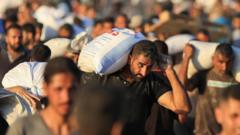The recent remarks by Amsterdam's mayor on the language used to describe attacks against Israelis have sparked a heated debate about the implications of historical terms in today's context.
The Controversy Over the Use of "Pogrom" in Recent Amsterdam Events

The Controversy Over the Use of "Pogrom" in Recent Amsterdam Events
Discussions arise over the implications of historical language concerning anti-Jewish violence in light of contemporary incidents in Amsterdam.
Amid rising tensions from recent anti-Israel actions in Amsterdam, Mayor Femke Halsema has faced backlash for her choice of words, specifically her use of the term "pogrom." On a Dutch television show, she expressed regret for invoking the term following the violence surrounding a soccer match on November 7. The backlash was fueled by Israeli Foreign Minister Gideon Saar, who labeled her remarks as “utterly unacceptable” and asserted that the attacks warranted the term "pogrom," which has profound historical significance linked to anti-Jewish riots predominantly occurring from the 1880s to the early 20th century.
The historical connotation surrounding "pogrom" complicates its contemporary usage, especially against the backdrop of increased sensitivity to antisemitism since the Hamas attacks in October 2023, which resulted in numerous casualties and hostages from Israel. Supporting this context, Israeli President Isaac Herzog and U.S. State Department envoy Deborah Lipstadt have echoed similar sentiments, emphasizing the seriousness of antisemitism today.
In stark contrast, Halsema’s hesitance to employ the term highlights her fears that its application could be manipulated to target the Muslim community, particularly amid the rise of far-right rhetoric in Europe. The influential figure Geert Wilders, who has made polarizing statements about Moroccan immigrants, also invoked the term "pogrom" in his rhetoric. His political stance, which hinges on anti-immigration policies aimed at Muslim communities, underlines the dichotomy in the interpretation of such historical terms in modern discourse.
This ongoing debate illustrates the delicate interplay between language, historical context, and contemporary social dynamics, reflecting broader tensions around identity, memory, and action in a diverse society.
The historical connotation surrounding "pogrom" complicates its contemporary usage, especially against the backdrop of increased sensitivity to antisemitism since the Hamas attacks in October 2023, which resulted in numerous casualties and hostages from Israel. Supporting this context, Israeli President Isaac Herzog and U.S. State Department envoy Deborah Lipstadt have echoed similar sentiments, emphasizing the seriousness of antisemitism today.
In stark contrast, Halsema’s hesitance to employ the term highlights her fears that its application could be manipulated to target the Muslim community, particularly amid the rise of far-right rhetoric in Europe. The influential figure Geert Wilders, who has made polarizing statements about Moroccan immigrants, also invoked the term "pogrom" in his rhetoric. His political stance, which hinges on anti-immigration policies aimed at Muslim communities, underlines the dichotomy in the interpretation of such historical terms in modern discourse.
This ongoing debate illustrates the delicate interplay between language, historical context, and contemporary social dynamics, reflecting broader tensions around identity, memory, and action in a diverse society.



















